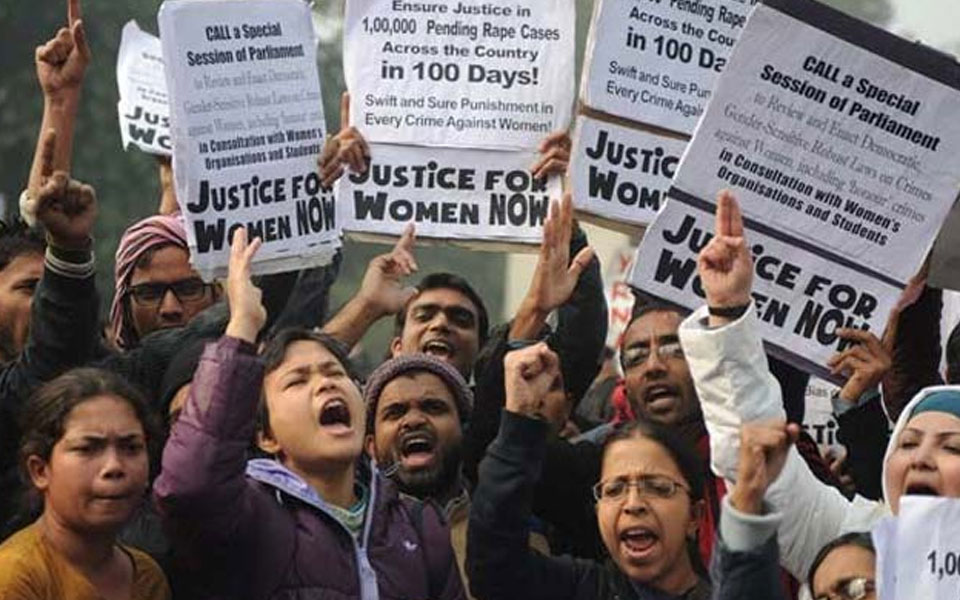Nirbhaya case that happened during UPA tenure drew the attention of the state towards rape cases and its victims. The resultant uproar and debate forced the govt to bring certain changes in the law related to rape victims.
The way the country responded to Nirbhaya case, one would have assumed that the rape cases would dwindle in the country. Unfortunately even during these four years of NDA, rape cases dominated the media.
Ironically the leaders within the govt seemed to be active in hushing up many a rape cases. When the very registering of a complaint by the rape victim looks hazardous, how one can expect a speedy justice from the state.?
In this country both acid attack victims and rape victims are fellow travelers. Both are an attack on the very persona of a woman. Rape victim suffers psychologically while acid attack victim suffers both physically and mentally to face the society and build the life all over again. Though acid attack is purportedly physical it intensely affects the mind of the victim.
As the society puts a premium on the physical beauty, the acid attack victim lives like an untouchable. Irony is that in both these ghastly cases the perpetrators of the crime go unpunished. The way the victims are treated during trial stage may be a major factor for this injustice. The rape victims are hesitant to wage an open protest against the perpetrator. Our society instead of looking down upon the perpetrator treats the victim harshly.
Precisely for this reason, the law enables the state to provide instant compensation to the victim to instill a sense of confidence. A separate fund has been established for this purpose in 2013. Irrespective of whether the victim gets justice in the ensuing legal battle, the state should provide for their rehabilitation instantly.
Tragic aspect of the whole deliberation is that only 23 victims from 9 states have received compensation from this fund. As per the National Legal service Authority only 510 rape victims were benefited with any compensation. Is the Govt stating that the victims of rape are only 500? If not, what explains the failure of the govt to compensate others?
The SC has already suggested that The National Legal Cell Authority can suo moto take up the issue and disburse compensation to the victims. The Court has ordered that all the states and UTs should provide compensation from minimum Rs. Five lakhs to maximum Rs. Ten lakhs.
In cases of rape and murder or mass rape the compensation is Rs. 10 lakhs. If the victim sustains 80% physical disability or severe disability and additional amount of minimum Rs. Five lakhs should be disbursed according to the honorable court.
In Acid attacks depending on the severity of attack Rs. 5-6 lakhs should be instantly disbursed irrespective of trial proceedings.
Rs. one lakh should be disbursed within fifteen days of the said incident and in the subsequent two months two lakh each should be disbursed. If the victim is a minor the compensation amount should be increased by 50% .
When the victim is suffering socially and psychologically this compensation would provide her some fillip. The compensation will also help the victim to meet the expenses of medical treatment, rehabilitation and legal battle. However the bureaucratic machinery seems to be trying its level best to hinder the speedy disbursement to the victim.
Police dilly dally even to register a complaint from the sexually harassed women. In case they are forced to register, they will get even with the victim by delaying the disbursement of the compensation.
If the victim belongs to oppressed class the compensation is pocketed by middlemen according to reports. According to a report submitted to SC, In 2017, 901 sexual harassment cases were reported from AP; however only one victim was provided with compensation.
In Rajasthan 3305 FIRs were registered; and only 140 victims received compensation. Similarly in Bihar 1199 FIRs were filed, while only 82 received relief. Even if we look at the quantum of relief, maximum relief was to the tune of Rs. 7000.
Though the society debates animatedly whether the perpetrator of the crime should be awarded capital punishment or not, there is a need to bring to the fore the punishment meted out to the victim indirectly. The society needs to discuss this dereliction of duty by the state.
One should not suffer for the crime one has not committed. The first step to ensure this is to see that the compensation stipulated by the law reaches the victim without any hassle or obstacle.
Let the Truth be known. If you read VB and like VB, please be a VB Supporter and Help us deliver the Truth to one and all.
Kalaburagi: Four men have been arrested in Kalaburagi on charge of hacking a man with lethal weapons and pelting stones at him under the limits of Station Bazaar Police Station recently.
According to police sources, Anand Jalak Shinde (34), Ashitosh Jalak Shinde (30), Imran Mehboob Sheikh (28) and Sohaib Anwar Qureshi have been arrested. The men are accused of the brutal murder of Syed Mehboob, a resident of Station Bazaar Upper Line Hamalawadi in the city.
An FIR was filed by the Station Bazaar Police Station based on a complaint given by Syed Ismail, father of the deceased Syed Mehboob.
Following quick probe, the police team successfully arrested the suspects within 24 hours. The arrested men were produced in court and have been sent to judicial custody.
The City Police Commissionerate has appreciated in an official release the police team’s quick solving of the murder case and arrest of the four men accused of murdering Syed Mehboob.





